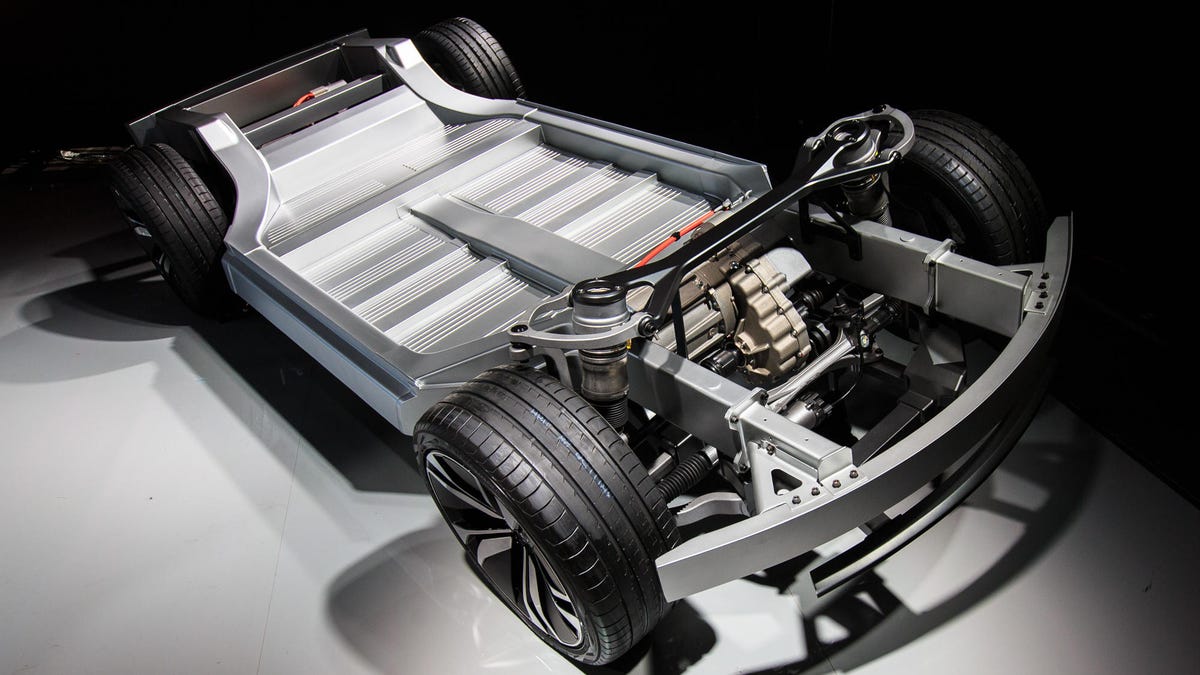The real way SF Motors wants to beat Tesla
1,000 horsepower electric cars are what you'll see, getting hooks into other companies' EVs are what SF Motors sees.

SF Motors CEO John Zhang laughs a little when he admits their brand stands for San Francisco, a city often at war with cars. But that bit of brand clumsiness won't matter if they don't nail a more important geography lesson: Prominence on the global map of the EV industry.
The company just unveiled its first two vehicles, the SF5 and SF7 high-performance electric crossovers. With up to 1,000 horsepower, 0-60 times as low as 3 seconds and 300 miles of range, they are premium crossovers that emphasize cachet and performance more than the ability to cart home an IKEA run in one trip. Pricing will be set when pre-orders for the SF5 begin end of 2018.
SF Motors CEO John Zhang is proud of his coming SF5 and SF7 cars, but just as eager to sell their guts.
In 2018 we are officially at peak "Tesla intender": Nio, Faraday, Lucid, Byton and SF Motors will all tell you they are utterly distinct from Tesla, but few of them would be here if Elon Musk hadn't set the table. Differentiating from Tesla, and each other, while still drafting on the former's $50 billion valuation halo is a dance that will turn on high performance, autonomous technology, bleeding-edge styling and an ability to actually build cars. That last part is where SF Motors thinks it wins.
"We design all the powertrain, interior and exterior in house," said CEO Zhang. "We also manufacture the motors, inverters and batteries in house. That gives us an advantage on cost and a true global business that attracts talent across the world."
A dizzying litany of locations follows: Exterior styling is from its studio in California, interiors from Germany, powertrains and batteries from plants in Indiana and China based on R&D done in China, Michigan, California and Germany, while autonomous drive testing is taking place at Michigan's Mcity and on public roads in California. But does all that in-house verticality mean SF Motors is more likely to succeed or just more likely to burn cash?
"Our product line is not limited to our vehicles but also our platform which we'll make available to the world," Zhang says as he turns the usual startup model on its head. Deflecting speculation that SF Motors just wants to evolve enough to be acquired, he feels they can become a platform vendor to other car companies while competing with them. A mashup of Intel and Google hardware playbooks, there.
The war chest for all this has come from $200 million of investment by Chinese conglomerate Chongqing Sokon Industry Group, money that seems less directed by the Chinese government than the backing of other Chinese carmakers. SF Motors has decided to eschew spending on the kind of factory groundbreaking theater that Faraday treated us to and instead buy an old AM General Hummer plant in Mishawaka, Indiana, that can crank out 50,000 cars a year while a bigger plant in China can do triple that.
Motors matter, but the battery is the soul of an EV. SF Motors snapped up Tesla founder Martin Eberhard and his latest venture, InEVit, to get a key advantage in solving the things about batteries that make EVs prickly.
Money saved on gold shovels also helped acquire battery startup InEVit and, critically, its boss and Tesla founder Martin Eberhard who is now SF Motors' Chief Innovation Officer and a plum hire in a circle of EV startups that have a merry-go-round of execs moving between them. Eberhard's involvement is perhaps the strongest indication of a secret sauce at SF Motors that will be worth all the manufacturing effort. He is focused on solving battery issues that have kept EVs in their awkward years: Weight, heat, cost, energy density and complexity of integration across diverse car models. SF Motors can refine motors, inverters and even autonomy tech all day and not make the leap they would enjoy from one major battery breakthrough.
It's a cruel world out there for EV startups. Tesla recently made an appeal for weekend assembly line shifts reminiscent of Dunkirk's little fleet, while the White House hates California's and 12 other states' ZEV requirements that buoy the EV market, and demand in general is propped up by an array of government carrots and sticks.
It doesn't matter how pretty it is, most people won't buy an EV if it doesn't make financial sense. Government incentives do that job now; a much lower cost per kilowatt hour battery will have to shoulder that burden in the future to give EVs a lower total cost of ownership than a gas-engined car.
On the other hand, worldwide EV sales crested 1 million units for the first time in 2017. While that is still just about 1 percent of all car sales worldwide, it's clear that electric cars are no longer cottage industry and that motor fuel prices have nowhere to go but up. About half of all EVs sold in 2017 were in China, where government mandates will likely move them from one percent share of new car sales in 2017 to eight percent by 2020 - a timeframe known in the car business as "tomorrow." Virtually all the Tesla challengers including SF Motors have Chinese roots and money but, more importantly, will find their make or break market is in China as well.
Tesla probably bristles at the constant comparisons to ankle-biter startups, and it's a fair complaint: While it is busy trying to move its Model 3 production volume from 200 cars a day to 300, challengers worry about getting their first 20 prototypes built. But the lesson of Silicon Valley is that companies often succeed because they don't realize they can't.

